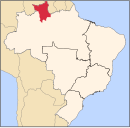Uiramutã
The municipality is located entirely inside the Raposa Serra do Sol Indian Reservation. Because of this, its economic activities are limited. As a result, Uiramutã is also noted for being the Brazilian municipality that depends the most on government funds: 80% of its income is provided by the public administration, including social insurance and welfare programs such as the Bolsa Família.
The town of Uiramutã was established in 1911 by Severino Pereira da Silva, a gold miner, who founded the village for both the indigenous and non-indigenous community. Uiramutã became an independent municipality in 1995, and can be accessed via the RR-171 road.
The town was once claimed by the United Kingdom as part of British Guiana in a territorial dispute with Brazil before arbitration by the King of Italy in 1904 validated most of the British claim while deviating in awarding the area west of the present-day border and east of the Contigo River between the Takutu River to the south and its source at the Mt. Roraima tripoint to the north.
Nature
The municipality contains the 116,748 hectares (288,490 acres) Monte Roraima National Park, a protected area created in 1989.
References
- ^ IBGE 2022
- ^ [1] - UNDP
- ^ Patu, Gustavo (19 December 2013). "Em Uiramutã, no extremo norte do país, governo responde por 80% da economia". Folha de S. Paulo (in Portuguese). Grupo Folha. Retrieved 19 December 2013.
- ^ "RR – Terra Indígena Raposa Serra do Sol". Eco Amazonia (in Portuguese). Retrieved 10 April 2021.
- ^ "Uiramutã". IBGE (in Portuguese). Retrieved 10 April 2021.
- ^ Unidade de Conservação: Parque Nacional do Monte Roraima (in Portuguese), MMA: Ministério do Meio Ambiente, retrieved 2016-06-07
External links
- Official website (in Portuguese)
 Media related to Uiramutã at Wikimedia Commons
Media related to Uiramutã at Wikimedia Commons

